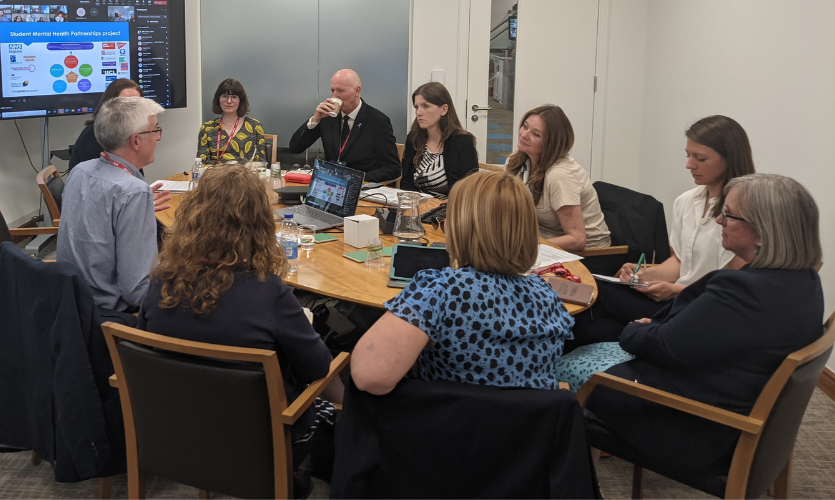'Liverpool Model' leads way in tackling gaps in student mental health services
Students are set to benefit from better join up of mental health services to prevent them falling through the gaps at university.

Students are set to benefit from better join up of mental health services to prevent them falling through the gaps at university as a result of Liverpool John Moores University's involvement in developing a new scheme, set to go national.
Yvonne Turnbull, LJMU's Director of Student Advice and Wellbeing has been working with University of Liverpool and Merseycare to develop new ways of connecting NHS and university services and providing one-on-one support for their students. On Monday, government announced their intention to invest £3million in replicating the lessons, learned in Liverpool's model, nationally.
The new scheme will bring together university, NHS and mental health services to create regional partnerships which could include physical hubs that students can visit in-person.
In the past, students may have suffered from delays in accessing mental health services when they have had to move location to study. By supporting these services to join up and better communicate, students can be supported in their mental health, enhancing the quality of their university experience and their likelihood of success in the future.
Minister for Higher and Further Education Michelle Donelan and Minister for Care and Mental Health Gillian Keegan brought together representatives from across the higher education and healthcare sectors, including LJMU's Yvonne Turnbull, to launch the new scheme and showcase examples where integration is already underway, sharing of effective practice, and lessons learned.
The Government is investing up to £3 million over the next academic year years with the initiative set to help ease the pressure on the NHS and higher education providers.
Minister for Higher and Further Education Michelle Donelan said: “Moving to a new place is one of the most exciting parts of going to university but can create barriers for students in accessing mental health services.
“We have brought together university and healthcare representatives to close any gaps between universities and NHS services so that all students can get the help they might need as they transition through university and beyond.
“I want students to feel supported in their mental health because we know this can affect their studies, boosting attainment and outcomes and helping them towards their bright futures.”
The Government's Press Release continues:
- Up to £3 million invested in closing the gaps between university and NHS services
- Local regional networks will join up services to better support students
- Initiative launched at a joint Department for Education and Department of Health and Social Care summit
Attendees at the roundtable including the Office for Students (OfS), Russell Group, Million Plus and NHS England heard from universities who are leading the way in connecting NHS and university services and providing one-on-one support for their students.
Five locations - Liverpool, Manchester, Bristol, Sheffield, and North London – have developed approaches to bring together services into a physical hub that students can visit, funded via the OfS challenge fund. For example, the Manchester clinic, based at the University of Manchester with satellite clinics at the University of Bolton and University of Salford, works in partnership with the region’s five universities and is supported by the Greater Manchester Health and Social Care Partnership. Services are accessed via a referral from university counselling services, providing a full range of mental health assessment, support and interventions to students.
This follows on from the appointment of Edward Peck as the Student Support Champion who will help ensure universities are tackling the issues that matter for students and help support universities to spot the first warning signs of students suffering with their mental health.
This role will also feed into cross-sector collaboration to tackle the issue of student mental health including the excellent work from the University Mental Health Charter, led by Student Minds. The charter works with student and universities to improve standards of practice around addressing mental health issues and Minister Donelan has set out her ambition for all higher education providers to sign up to the programme within the next five years, if not sooner.
The Government is increasing investment in children and young people’s mental health services faster than the overall budget for mental health to ensure they can access support as early as possible to prevent any problems deteriorating.
The Government has launched a 12-week call for evidence which is open to people of all ages and is seeking views on what can be improved within the current service and build understanding of the causes of mental ill-health. This will inform a new 10-Year Mental Health Plan to level up mental health across the country and put mental and physical health on an equal footing. The plan will build on current progress, assessing how local services can work together to prevent mental ill health.
Significant progress is also being made in children and young people’s mental health services - more than 2.4 million children and young people now have access to mental health support in schools and colleges thanks to the Mental Health Support Teams and the £10 million investment from the Department for Education to extend senior mental health lead training to more schools and colleges.
More widely, the government is investing at least £2.3 billion of extra funding a year to expand and transform mental health services by 2023/24 as part of the NHS Long Term Plan. On top of this, £500 million has also been provided in 2021/22 specifically to support those most impacted by the pandemic to address waiting times and expand the mental health workforce. This included £79 million for children’s mental health services last year, enabling around 22,500 more children and young people to access support in their communities, and across schools and colleges. The NHS children and young people’s mental health workforce has also grown 40% since 2019.


